Understanding CRM: What It Is and Why It Matters
Customer Relationship Management (CRM) is a system that helps businesses manage customer interactions, streamline processes, and boost engagement. CRM tools organize valuable data like purchase history, preferences, and feedback, offering a clear view of customer needs.
More than a digital contact list, CRM platforms let businesses segment audiences, personalize marketing, track sales leads, and improve customer support. Key features often include contact management, sales forecasting, real-time analytics, and app integrations for email, calendars, and social media.
Using a CRM effectively helps companies enhance customer retention, increase sales, and drive growth by delivering personalized, data-driven experiences. As competition rises, CRM systems are essential for building lasting customer relationships and staying ahead.
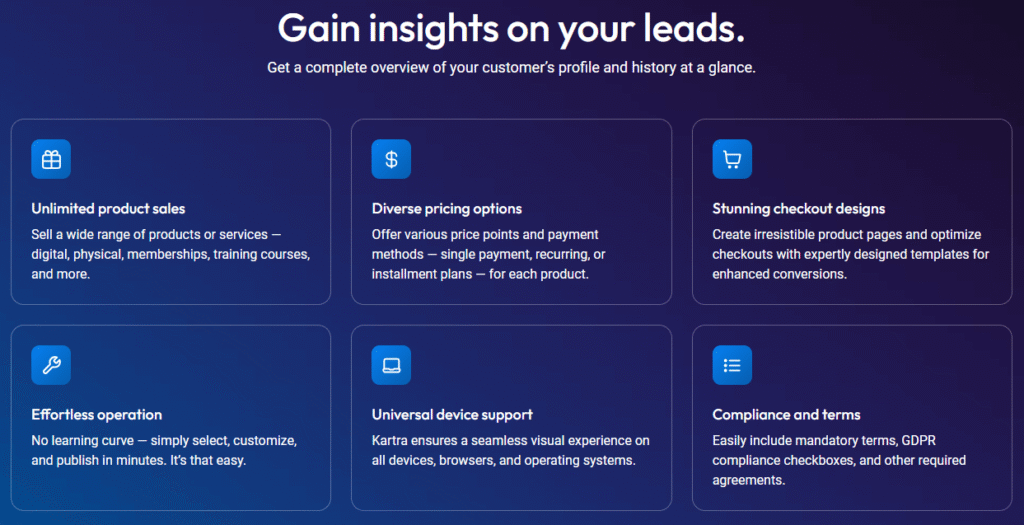
“If you haven’t read my last blog, you can find it here:”
Kartra at First Glance: Features and Functionalities
Kartra serves as an all-inclusive business platform designed to streamline marketing, sales, and customer management processes. Unlike traditional CRM systems that focus solely on tracking and organizing customer relationships, Kartra integrates a multitude of tools aimed at boosting productivity and optimizing campaigns. Its features go beyond the conventional CRM functionalities, giving businesses access to a powerful suite of marketing tools.
Key Features
Kartra offers an array of features tailored to enhance marketing and customer management processes:
- Page Builder: The drag-and-drop page builder lets users create stunning landing pages without coding expertise. Equipped with pre-designed templates, this tool is ideal for businesses striving to enhance user engagement.
- Email Marketing: Kartra’s built-in email marketing system supports automated sequences, personalized broadcasts, and behavioral tagging. It enables efficient lead nurturing and communication strategies.
- Sales Funnels: With Kartra, users can design custom sales funnels to guide prospects through a seamless conversion journey. It simplifies the complex process of structuring promotional campaigns.
- Membership Sites: Kartra allows users to set up secure membership portals for courses, subscriptions, or exclusive content. The platform integrates subscription management and content delivery effortlessly.
- Video Hosting: Businesses can upload, customize, and host videos while gaining insights with analytics that cover viewer engagement and interaction.
- Helpdesk Integration: Kartra’s helpdesk feature includes ticket systems and live chat, ensuring customers can receive assistance directly from the platform.
- Affiliate Management: Businesses can manage affiliate programs through Kartra, complete with tracking links, payout automation, and detailed reporting dashboards.
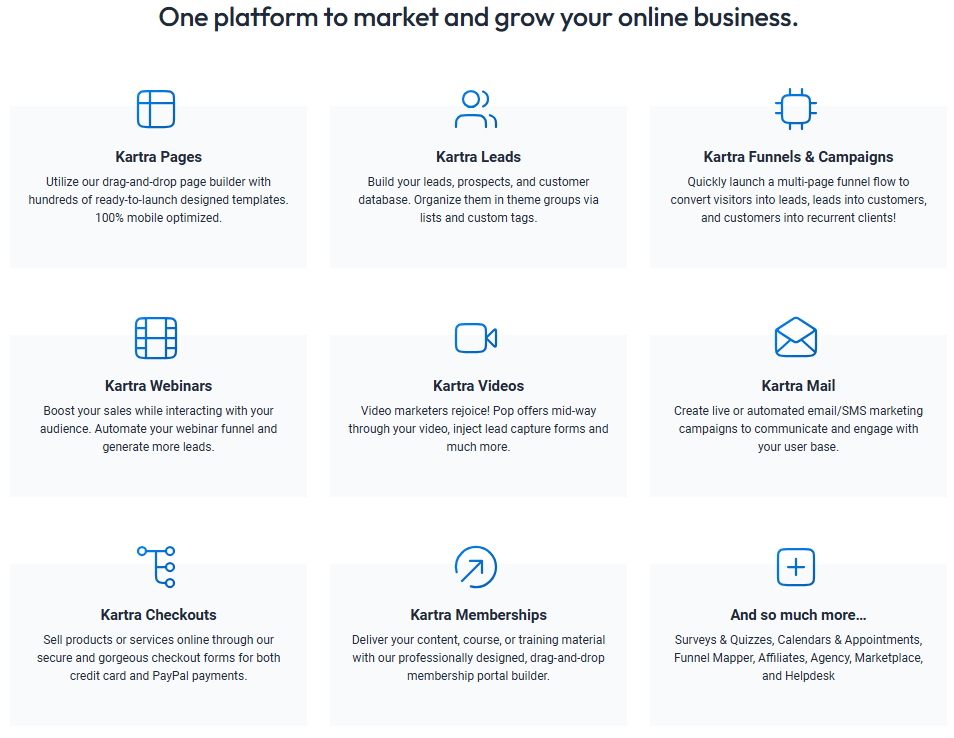
Functional Advantages
Kartra’s functionalities extend further by combining automation and productivity tools:
- Centralized Platform: Instead of juggling multiple business software solutions, users can consolidate their operations within one unified platform.
- Integrated Analytics: Dashboards deliver real-time insights into campaign performance, customer behavior, and sales metrics. This enables informed decision-making and adjustments.
- Customizable Automations: Automations can be tailored based on triggers like purchase events, email clicks, or sign-ups, simplifying workflows.
- Cloud-Based Accessibility: As Kartra operates entirely in the cloud, it eliminates the need for additional hardware or software installations, promoting flexibility for on-the-go management.
By combining these robust tools, Kartra provides users with a dynamic solution that supports marketing, sales, and customer engagement in one cohesive ecosystem. Its breadth of features sets it apart, catering to entrepreneurs, small businesses, and large enterprises alike.
Is Kartra a CRM? Breaking Down the Core Definition
Kartra is best described as an all-in-one marketing platform with built-in CRM features, rather than a traditional CRM system. While it allows users to organize leads, track sales activity, segment audiences, and automate communications, its primary focus is on marketing automation, sales funnels, membership sites, and analytics.
Unlike classic CRMs like Salesforce or HubSpot, which are heavily data-centric and team-focused, Kartra blends marketing and customer management into one streamlined tool. It’s ideal for entrepreneurs and small businesses seeking a simple solution to manage marketing campaigns and basic customer relationships, but it’s not a full-scale CRM platform.
Kartra’s Integrated Approach: CRM Meets Marketing Automation
Kartra exemplifies the convergence of CRM functionalities with robust marketing automation tools, making it a holistic platform for managing customer relationships and streamlining marketing processes. Unlike traditional CRM systems, which focus on contact management and sales processes, Kartra goes beyond the conventional scope by integrating marketing features directly into its framework. This synergy allows businesses to manage customer data and automate various workflows from a single interface.
At its core, Kartra incorporates detailed segmentation capabilities to help users tailor their interactions to specific audience groups. By tracking individual customer behavior, including page visits, email engagement, and purchase history, businesses gain actionable insights essential for personalized marketing efforts. These features facilitate highly targeted campaigns, ensuring prospects receive the right message at the right time.
Key Features of Kartra’s Integration:
- Centralized Dashboard: Kartra combines CRM data and marketing tools under one roof, enabling users to access everything needed for customer interactions without toggling between systems.
- Behavioral Analytics: The platform automatically logs actions such as clicks, conversions, and purchases, creating a dynamic profile for each contact. This empowers users to refine marketing strategies based on real behavioral insights.
- Automation Triggers: Predefined workflows allow users to set triggers that automate actions like email follow-ups, lead scoring, or upsell offers based on specific criteria.
- Integrated Analytics: Users can track campaign performance alongside customer data, simplifying the evaluation of marketing ROI.
Kartra’s design eliminates the need for separate tools to manage emails, landing pages, and sales funnels. Its ability to combine CRM functions with marketing automation ensures businesses operate more efficiently. By leveraging Kartra’s consolidated approach, users can maintain seamless interactions with prospects while maximizing growth opportunities.
Exploring Kartra’s Contact Management Capabilities
Kartra’s contact management system offers a robust suite of tools for businesses to efficiently manage leads and clients. It provides a centralized hub where businesses can store, track, and engage with their audiences, making it a core feature of the platform. Unlike traditional CRMs, Kartra integrates marketing automation seamlessly with its contact management system, offering a blend of organization and direct engagement.
One key feature is the extensive contact profiling system. Kartra enables users to gather detailed data on individual leads, including their personal information, behaviors, purchase histories, and interaction patterns. This granular insight is accessible via intuitive dashboards and allows businesses to tailor their strategies to specific customer segments.
The advanced tagging and segmentation functionalities further enhance contact management. Tags can be assigned based on user activity, such as form submissions, email clicks, or product purchases. These tags allow businesses to create dynamic audience segments for personalized campaigns, ensuring that marketing efforts remain targeted and effective.
Kartra also excels with its automation features related to contact management. Users can set up behavior-triggered actions, such as automatically adding subscribers to email sequences, sending follow-up emails, or assigning tasks to team members. This level of automation eliminates manual processes and enhances productivity.
Additionally, the system includes tools for tracking contact engagement and scoring leads. By analyzing engagement metrics like email opens, purchases, and course completions, businesses can prioritize high-potential leads. This data is presented alongside actionable analytics, simplifying the decision-making process.
By combining contact management with marketing automation, Kartra allows businesses to foster deeper relationships with their audience while saving time and resources.
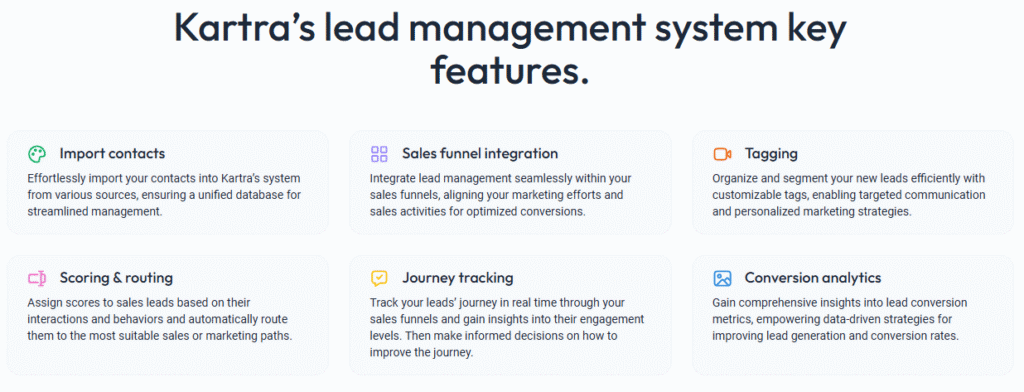
Email Marketing and Automation: A Seamless Blend
Kartra offers a robust suite of email marketing and automation tools designed to streamline communication and enhance user engagement. With its drag-and-drop email editor, users can effortlessly design visually appealing email campaigns that align with their brand identity. The platform supports rich media inclusion, enabling videos, images, and buttons to be embedded seamlessly for more interactive email experiences.
One of Kartra’s standout features is its behavior-based automation capability. This allows marketers to trigger specific email sequences based on user actions, such as clicking a link, visiting a page, or completing a purchase. Such functionality ensures that subscribers receive content that is tailored to their personal journey, fostering better connections and boosting conversion rates.
Kartra’s segmentation tools further enhance personalization. Users can create targeted lists based on factors such as demographics, purchase history, or engagement levels. This segmentation ensures that email campaigns reach the right audiences, improving relevance and maximizing the impact of every message. Additionally, automated split-testing helps refine strategies by identifying which subject lines, designs, or content resonate most effectively with recipients.
The platform also integrates email analytics to provide comprehensive insights. Metrics like open rates, click-through rates, and conversion rates are easily accessible, allowing marketers to measure performance and make data-driven improvements to their campaigns. These insights are presented in a user-friendly dashboard, making them actionable even for beginners.
For ongoing communication, Kartra automates recurring email sequences like nurture campaigns or follow-up messages. This eliminates manual effort while ensuring consistent user engagement. The advanced automation capabilities, paired with intuitive design tools and clear analytics, make Kartra’s email marketing system indispensable for businesses aiming to scale their strategies efficiently.
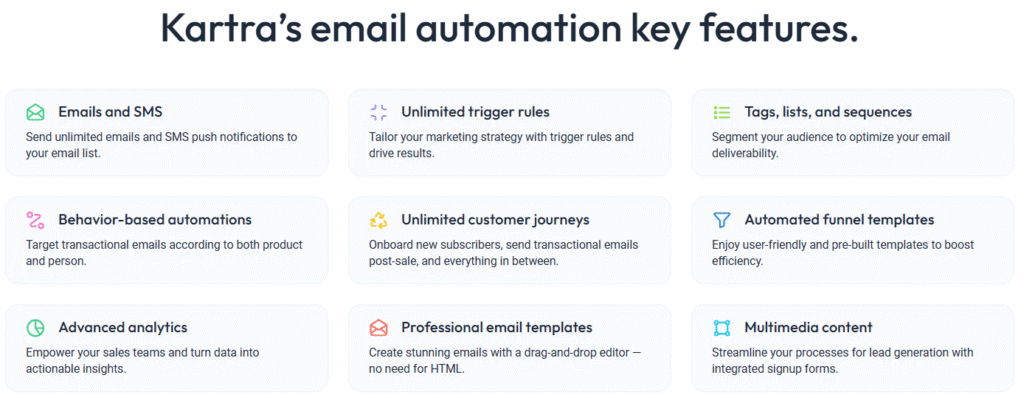
Kartra Funnels: A Powerful Tool for Optimized Conversions
Kartra Funnels are designed to help businesses streamline their customer journey and maximize conversions effectively. By providing an intuitive drag-and-drop interface, Kartra enables marketers to design and customize sales funnels tailored to specific goals. These funnels orchestrate every step of the customer’s experience, from initial contact to post-sale engagement, ensuring a smooth transition through each stage.
One key feature of Kartra Funnels is their automation capabilities. Marketers can set up triggers and rules to dynamically lead users down different paths based on their actions. For example, if a lead clicks on a specific offer, the funnel can immediately direct them to a follow-up page relevant to their interest. This level of precise targeting reduces drop-offs and increases the likelihood of conversions.
Kartra Funnels also integrate seamlessly with other tools within the platform, such as email marketing, membership sites, and payment processing. This ensures that users are not only guided through clearly defined steps but are also provided with the resources to act on decisions. Businesses can incorporate upsells, downsells, or cross-sells into their funnels without needing third-party plugins or custom coding.
To enhance performance, Kartra includes analytics and reporting tools that allow businesses to monitor funnel effectiveness. By tracking metrics such as click-through rates, conversion percentages, and time spent on pages, marketers can refine their strategies to ensure better results. The ability to A/B test different funnel variations provides deeper insights into what resonates with the audience.
The visual editor simplifies the design process for users of all skill levels, while pre-built templates cater to industries ranging from e-commerce to coaching services. These templates save time and adhere to proven strategies for engagement and sales. By no means are businesses limited to these designs, as every aspect of a funnel is editable to suit unique brand needs.
With Kartra Funnels, businesses unlock a unified and compelling workflow for guiding leads, fostering relationships, and driving revenue growth—all within a single marketing platform.
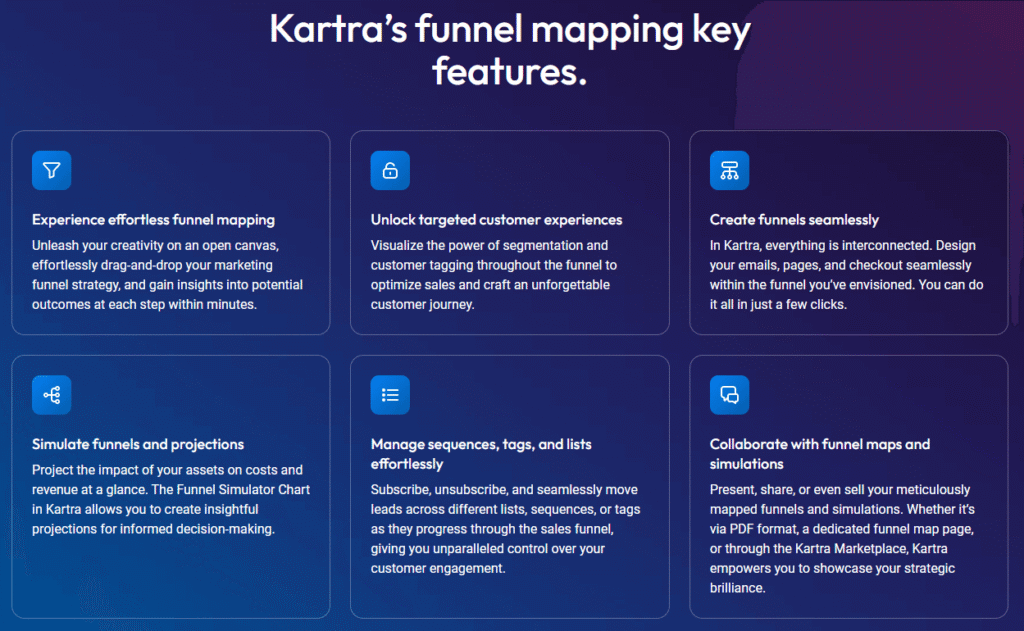
Membership Sites and Helpdesk: Beyond Traditional CRM
Kartra extends beyond the conventional scope of Customer Relationship Management (CRM) systems, delving into tailored business functionalities such as membership sites and integrated helpdesk tools. While CRM platforms traditionally focus on managing customer data, Kartra empowers users to create and operate membership-based communities with seamless efficiency. These robust features cater to businesses that thrive on subscription models, online courses, or gated content.
Key Features for Membership Sites
Kartra’s membership site functionality offers intuitive tools for structuring, designing, and managing member-exclusive content. With this feature, users can:
- Create Multiple Membership Levels: Businesses can define tiers such as free, premium, or VIP access, customizing content visibility based on the membership level.
- Automated Access Control: Members receive login credentials instantly upon opt-in or payment, ensuring a frictionless onboarding process.
- Built-In Analytics: Users can track member activity, engagement rates, and content consumption patterns to optimize offerings.
- Content Security: Kartra safeguards sensitive materials by preventing unauthorized sharing or distribution through its secure access systems.
These tools position businesses to cultivate long-term customer loyalty while monetizing valuable resources effectively.
Integrated Helpdesk Tools
Another notable feature is Kartra’s helpdesk system, which shifts it further away from conventional CRM expectations by introducing customer support solutions directly within your marketing ecosystem. Kartra’s helpdesk includes powerful functionalities such as:
- Ticket Management: Businesses can organize and resolve customer inquiries with categorized ticketing, streamlining resolution processes.
- Live Chat: Real-time communication allows instant support for members and customers, enhancing satisfaction.
- Automated Responses: Pre-programmed replies to frequently asked questions save time while maintaining responsiveness.
- Customer Journey Integration: All interactions from the helpdesk tie back to the user’s profile, combining support history with marketing insights.
These features ensure seamless customer service delivery while strengthening the interplay between support teams and marketing strategies.
By incorporating these tools into the platform, Kartra demonstrates its ability to transcend traditional CRM definitions, making it a hybrid solution for marketing, membership management, and customer support.
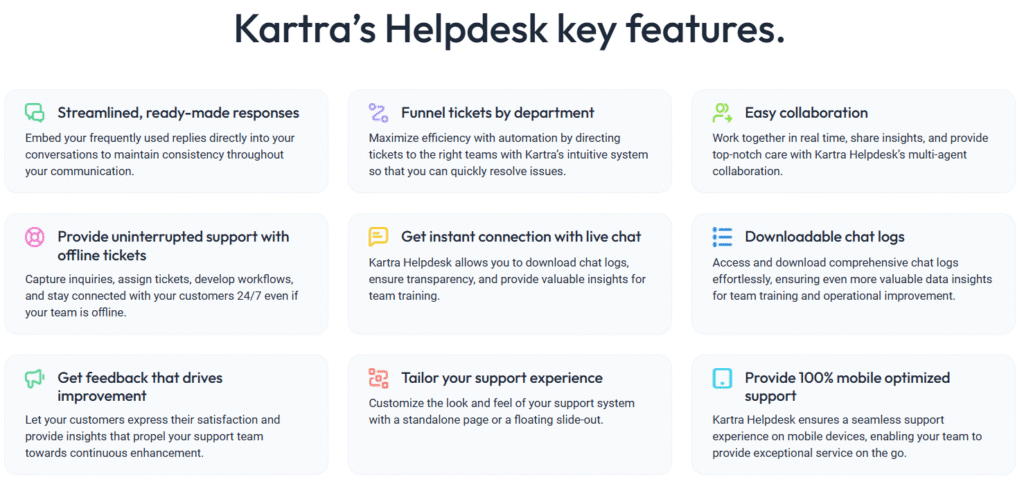
Kartra Analytics: Measuring Success with Detailed Insights
Kartra equips users with a suite of analytics tools designed to provide granular insights into marketing performance. These tools allow businesses to track, measure, and refine their strategies across every customer interaction point. Kartra’s analytics go beyond mere numbers; they deliver actionable data that helps users make informed decisions to optimize campaigns and improve overall efficiency.
With Kartra Analytics, users gain access to multiple tracking dimensions that can monitor key performance indicators (KPIs) in real time. These include metrics such as email open rates, click-through rates, video engagement, and sales conversions. The platform uses a visualized dashboard to present these data points, ensuring they are both accessible and easy to interpret. This empowers marketers to identify trends or bottlenecks quickly.
One of Kartra’s most impactful tools is the ability to track customer behavior throughout the sales funnel. By monitoring interactions on landing pages, shopping carts, and membership portals, users can pinpoint stages where prospects drop off or convert. This detailed examination of customer journeys facilitates strategic adjustments that directly improve outcomes.
Another standout feature is split-testing, which enables users to compare different versions of emails, pages, or forms to determine what resonates best with their audience. Combined with detailed reporting, this advanced capability eliminates guesswork, allowing data-driven campaign optimizations.
Kartra also enables tagging and segmenting, providing a deeper understanding of audience behavior. Tags can be used to categorize prospects based on their actions, enabling personalized marketing efforts. Detailed analytics around segmentation performance contribute to targeted and efficient campaigns, resulting in higher ROI.
Whether assessing long-term trends or evaluating daily performance, Kartra Analytics equips businesses with the insights needed to track success and refine growth strategies. Through its comprehensive toolset, users can unearth deeper customer understanding and improve marketing precision. The ability to transform raw data into actionable insights makes Kartra a valuable asset for any growth-focused business.
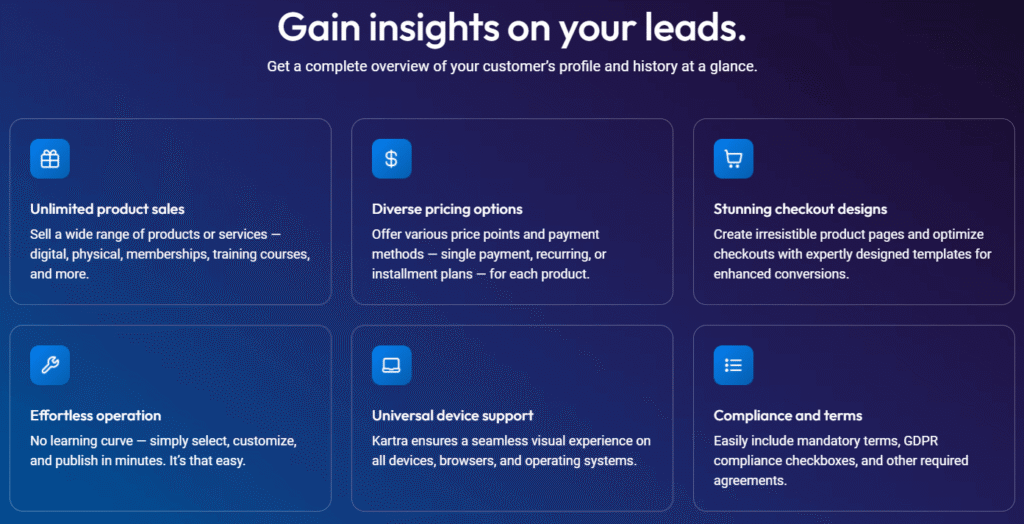
How to Get Started with Kartra: A Quick Guide
Getting started with Kartra involves a series of structured steps, ensuring users can seamlessly integrate its features into their marketing and customer relationship processes. Kartra offers an intuitive interface, but preparation and understanding are key to leveraging its full functionality.
- Sign Up and Log In Begin by creating an account on the Kartra website. Choose the subscription plan that aligns with your business needs. After registration, log in to the Kartra dashboard to explore its interface and tools.
- Set Up Your Profile and Business Information Complete your profile settings by adding your business name, logo, contact information, and branding elements. This ensures consistency across your campaigns and provides a professional appearance.
- Familiarize Yourself with the Dashboard The Kartra dashboard is designed to be user-friendly, with a clear menu for easy navigation. Take time to explore core sections like “Campaigns,” “Products,” “Pages,” and “Leads” to understand the platform’s structure.
- Create and Customize Pages Use Kartra’s drag-and-drop page builder to create visually appealing landing pages. Choose from a variety of pre-designed templates or start from scratch to reflect your brand identity.
- Integrate Essential Tools Connect Kartra to other tools such as email services, payment gateways, or third-party apps. This integration ensures smooth operation across your marketing ecosystem.
- Import or Add Leads Upload existing leads or use Kartra’s lead capture tools to collect new ones. Organize and segment your leads within Kartra’s CRM for targeted campaigns.
- Launch Your First Campaign Use Kartra’s pre-built campaigns or design your own. Customize automation workflows, email sequences, and triggers to match your marketing goals.
- Monitor and Optimize Performance After launch, track your campaign’s performance using Kartra Analytics. Review metrics like conversion rates, email open rates, and page visits to fine-tune your strategy.
By actively engaging with Kartra’s features, users can quickly adapt to the platform and maximize its potential for business growth.
Final Verdict: Is Kartra Truly a CRM or Something More?
Kartra’s marketing platform sits at the intersection of traditional CRM systems and a comprehensive business solution. While CRM systems typically focus on client relationship management, Kartra goes much deeper, offering an integrated suite of tools designed not just to track customers but to engage and nurture them throughout their lifecycle. With modules focused on lead management, email marketing, campaign automation, and sales funnel creation, Kartra blurs the lines between CRM software and robust marketing platforms.
To understand whether Kartra qualifies as a CRM, it’s essential to examine its functionality. Here’s what sets Kartra apart:
- Customer Relationship Management: Kartra does provide the basics of CRM functionality, including lead tracking, segmentation, and contact organization. Users can monitor customer interactions, track behavior, and personalize customer communication—key features of any competent CRM.
- Marketing Tools: Beyond managing customer relationships, Kartra supports advanced functions, such as email marketing campaigns, landing page creation, and video hosting. These ensure marketers can implement end-to-end strategies without relying on external tools.
- Automation Capabilities: Automation is central to Kartra’s appeal. Users can build workflows and marketing sequences that respond to specific customer actions, automating repetitive processes like follow-ups and upselling. This moves Kartra beyond the scope of traditional CRMs and into the domain of marketing ecosystems.
- E-Commerce Features: Kartra also integrates tools for product management and sales. These include shopping cart functionality, upsell opportunities, and affiliate management, making it a powerful choice for businesses engaged in online sales.
Kartra’s blend of CRM features with advanced marketing capabilities positions it as an all-in-one platform for entrepreneurs and businesses. It fulfills standard CRM functions while offering tools normally found in marketing software, making it more than a typical client management system. For those seeking versatility, Kartra delivers a solution that addresses both customer data management and strategic outreach efficiently.

